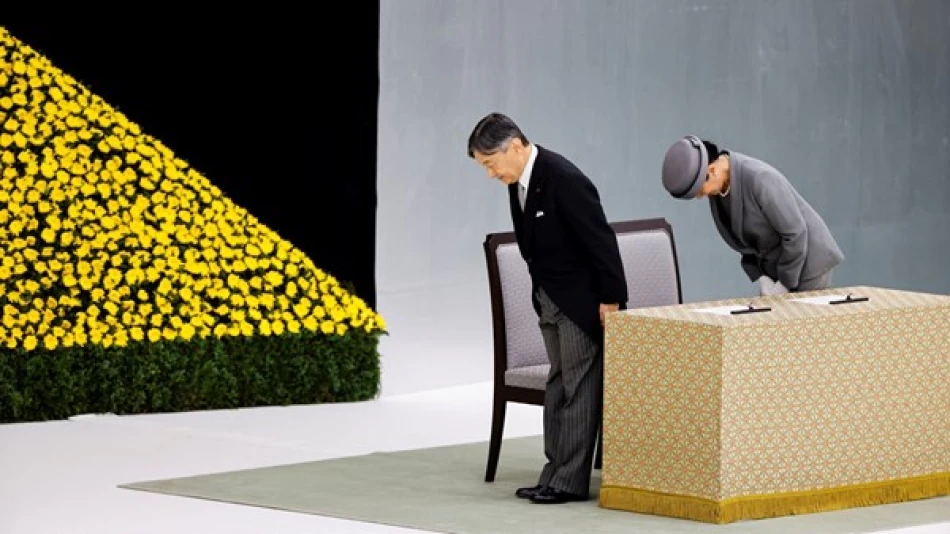
Japan's Emperor Expresses Profound Regret on WWII Anniversary
Japan's Emperor Expresses "Deep Remorse" on 80th Anniversary of WWII Surrender
Emperor Naruhito delivered an emotionally charged address marking eight decades since Japan's World War II capitulation, expressing "deep and renewed sorrow" while emphasizing the nation's commitment to preventing future conflicts. The ceremony underscores Japan's ongoing efforts to balance historical accountability with its evolving role as a regional security partner amid rising tensions in the Indo-Pacific.
Imperial Reflection on Wartime Legacy
Speaking alongside Empress Masako in a closed ceremony in central Tokyo, the 65-year-old Emperor delivered remarks that carried significant weight for Japan's post-war identity. With the national flag lowered outside the venue, Naruhito stated his thoughts were "with the large number of people who lost their precious lives in the recent war and with their bereaved families."
The Emperor's choice of words—particularly "deep remorse"—represents a continuation of Japan's carefully calibrated approach to wartime memory, balancing domestic sensitivities with international expectations for accountability.
Commitment to Peace Through Historical Memory
"Through reflecting on our past and recalling feelings of deep regret, I hope that the tragedies of war will never be repeated," Emperor Naruhito emphasized, reinforcing Japan's constitutional commitment to pacifism while acknowledging the human cost of its wartime actions.
Political Leadership Reinforces Memorial Message
Prime Minister Shigeru Ishiba complemented the imperial message with his own pledge to "preserve the painful memories of war... pass them on across generations, and strive to take steps toward lasting peace." This alignment between the ceremonial head of state and political leadership demonstrates Japan's institutional consensus on war memory.
Strategic Implications for Modern Japan
The 80th anniversary commemoration comes as Japan navigates complex security challenges, including North Korea's missile program, China's military expansion, and the ongoing conflict in Ukraine. Japan's emphasis on historical reflection serves multiple purposes: maintaining domestic legitimacy for its pacifist constitution while justifying increased defense spending and security partnerships.
Regional Context and International Relations
Japan's approach to war memory remains crucial for its relationships with South Korea and China, both of which suffered under Japanese occupation. The Emperor's expressions of remorse help maintain diplomatic space for cooperation on shared security concerns, even as historical grievances periodically resurface in bilateral relations.
Unlike Germany's more explicit acknowledgment of wartime crimes, Japan's memorial language has traditionally been more restrained, making the Emperor's "deep remorse" particularly significant for regional audiences seeking evidence of genuine contrition.
Constitutional and Cultural Significance
The ceremony reflects Japan's unique post-war settlement, where the Emperor serves as a symbol of national unity while the pacifist constitution constrains military action. As Japan gradually expands its security role—including recent defense budget increases and enhanced alliance cooperation—these annual commemorations serve as important reminders of the country's commitment to peaceful resolution of conflicts.
The emphasis on intergenerational memory transmission also addresses domestic concerns about historical amnesia among younger Japanese, ensuring that wartime lessons remain relevant as the nation adapts to new security realities.
Most Viewed News

 Layla Al Mansoori
Layla Al Mansoori






